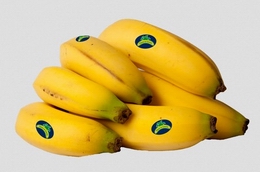 The current campaign for the brand "Plátano de Canarias" is marked by a slight fall in prices due to low consumption, as well as lower production volumes as a result of adverse weather conditions.
The current campaign for the brand "Plátano de Canarias" is marked by a slight fall in prices due to low consumption, as well as lower production volumes as a result of adverse weather conditions."The campaign is not developing as smoothly as last year, because average prices are lower and production so far could be up to 3% lower. There is a clear lack of consumption and customers seek low prices," explains Mr Rafael Pitaluga, National Coordinator for Canary Island bananas of Grupo Eurobanan.
During March, storms with strong winds of up to 120 km/hour caused severe damage on banana plantations and big losses.
"The consequences of the last storms are difficult to estimate, but it is clear that they will have a huge impact on the production," he affirms.
The natural and almost only market for "Plátano de Canarias" is Spain, both in the Canary Islands, where consumption is quite high, and the Peninsula. The other market where they are sold is Portugal, as according to Mr Pitaluga, it is mainly used as a substitute for Madeira's fruit. In their search for new markets, "small tests are currently being conducted in England by an important supermarket chain," he adds.
Competition with Latin American and African bananas
"Thanks to advertising campaigns and promotions, Canarian bananas are well appreciated in the Spanish market, and luckily, Latin American and African bananas have to rely on prices to increase their market share. On equal prices, Canarian bananas will prevent any increase in the consumption of bananas from other origins. The latter are nowadays sold as a different product and their consumption is limited."
Why are the flavour and properties of Canarian bananas different to other bananas? It can be said that Canarian bananas have a higher degree of ripeness and they stay for longer in the plant compared to tropical bananas. This is due to the shorter distance between producing areas and their markets.
"The main characteristics and advantages of our bananas are their flavour and texture. The proximity between producers and traders is essential to offer a product with great flavour, compared to tropical bananas, which merely have a better and cleaner appearance, but with much blander flavours and subject to long distance shipments that will lead to a loss in their qualities."
Grupo Eurobanan currently owns 9 ripening centres located in Alicante, Murcia, Valencia, Madrid, Barcelona, Bilbao, Palma de Mallorca, Seville and Vigo, with a total capacity of 117 trucks per week.
Grupo Eurobanan's exclusive brand is COPLACA. "It is the largest banana cooperative in the Canary Islands, concentrating around 35% of the production and bringing together around 4,500 growers from 15 cooperatives. COPLACA is also considered the largest producers organisation in the EU," concludes Rafael Pitaluga.





